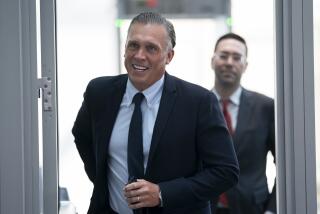GAO Also Urges Probe of Deaver : Cites Possibility of Three Interest-Conflict Abuses
- Share via
WASHINGTON — Michael K. Deaver took part in at least 15 meetings on the subject of acid rain before leaving his White House post to become the Canadian government’s lobbyist on resolving that problem and other issues, the General Accounting Office told a congressional subcommittee Monday.
In submitting their report on the lobbying activities of President Reagan’s former aide and confidant, GAO officials said that Deaver might have violated three provisions of federal law involving conflicts of interest. The officials said the Justice Department should resolve the question by conducting a full-scale criminal investigation.
It is the third call for a probe of Deaver.
The report by the GAO, the investigative arm of Congress, disclosed that Deaver’s concern with acid rain while serving as White House deputy chief of staff was much more extensive than previously known. Deaver has said that he was only generally involved with the pollution issue while planning the March, 1985, meeting between Reagan and Canadian Prime Minister Brian Mulroney. Deaver resigned from the Administration two months after that meeting.
In testifying Monday before the House Energy and Commerce oversight and investigations subcommittee, GAO deputy counsel James F. Hinchman said that Deaver may have broken the law because he participated “personally and substantially” in making decisions related to acid rain while at the White House and later represented Canada’s side of the issue in discussions last October with Drew Lewis, Reagan’s special envoy on acid rain.
Hinchman was referring to a breakfast meeting held by Deaver, Lewis and Canadian officials on Oct. 25, 1985, at the exclusive River Club in New York. He said some participants told the GAO that Deaver “did not participate in or contribute to discussions of the substantive content” of a report on acid rain that Lewis and his Canadian counterpart, William A. Davis, issued in January, 1986. Deaver’s main concern was the timing of the report, the GAO was told.
Nonetheless, Deaver’s “very presence at that meeting appears to constitute assistance in representation” of Canada, Hinchman testified. He said that federal conflict-of-interest law prohibits “all forms of assistance in the representation of another” party by being present at such a meeting.
Contacts Barred
Aside from representing a client on a matter that Deaver had personally worked on in government, Hinchman said, the former Reagan aide may have violated a prohibition against contacting anyone at the White House for one year, because Lewis was a presidential appointee receiving White House funds and administrative support.
Moreover, Deaver was bound by law for two years not to represent any client on a matter over which he had general supervision and which was pending when he left the White House, Hinchman testified.
But Herbert J. Miller, Deaver’s attorney, said after the hearing that “no new facts” had emerged and that the GAO had only raised the possibility of federal violations.
“There has been no complete investigation yet,” Miller said. “Mr. Deaver himself has called for the appointment of a special counsel to achieve a full, fair and complete review and investigation of these matters.”
By referring its findings to the Justice Department, the GAO added yet another voice in favor of appointing such a special counsel. The federal Office of Government Ethics has referred the Deaver case to the department for a criminal investigation, and five Democratic senators have requested that an independent counsel be named.
Deaver has agreed to testify before the House subcommittee, which is headed by Rep. John D. Dingell (D-Mich.), at a closed meeting Friday. He is expected to be questioned about a number of his lobbying activities, not just the Canadian acid rain issue.
Backed Special Envoys
Hinchman said that two other former White House officials--Budget Director David A. Stockman and National Security Adviser Robert C. McFarlane--told him that Deaver, while still serving Reagan, “endorsed or actively supported” the concept of appointing special U.S. and Canadian envoys on acid rain in at least 15 White House meetings leading up to the March, 1985, meeting between the President and Mulroney.
Earlier this year, the special envoys selected at that meeting recommended a five-year, $5-billion program to reduce acid rain pollution by U.S. industries, and Reagan--in a reversal of position--endorsed the concept.
Although Hinchman said there were “rumors” that Deaver had discussed his future $105,000-a-year employment by Canada while still serving in the White House--an action that would be illegal--the GAO official testified that his investigation “found absolutely no evidence to support those rumors.”
More to Read
Sign up for Essential California
The most important California stories and recommendations in your inbox every morning.
You may occasionally receive promotional content from the Los Angeles Times.













